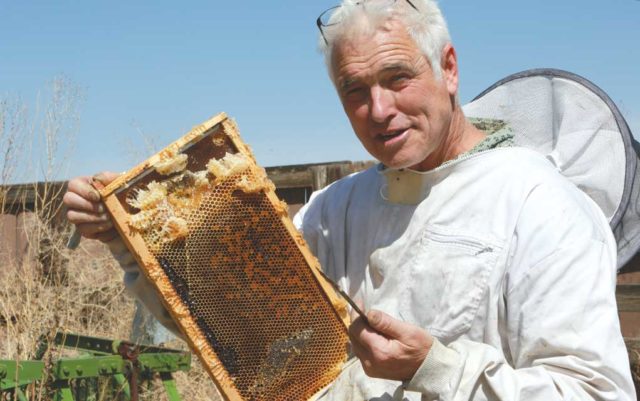
Tim Brod has spent a lifetime having close encounters of the stinging kind with the bees he lives and works with. But he’s not one to blame the fuzzy critters.
“Usually when you walk into their flight path, the bees will just bounce off you and you can get out of the way. Last week, I got stung in the face near my eye,” Brod says with a shrug.
“The bee must have been flying backwards when it ran into me. Bees are benign until they’re not,“ Brod says, as he pulls jars of honey from various cabinets at the home office of his Highland Honey in Longmont.
Brod’s honey is strictly local. The vast majority of his hives are within Boulder County — that’s 741 square miles. Highland Honey is always “polyfloral” because his bees have a smorgasbord of very different flowers, grasses and herbs blooming at varying elevations including dandelion, crab apple, dogwood, basswood, sage, mint and clover.
Highland Honey is sold mainly in Colorado, but Brod ships a lot to Saudi Arabia, which has a long and celebrated honey history. “I worked for years for The U.S. Agency for International Development on honey projects in the Middle East so I speak Arabic. Students I meet at the Farmers Market send the honey home by the case,” he says.
Brod has bees in his family tree. “We had beekeepers on both sides of the family — Ukrainian and Canadian. I remember being a 3- or 4-year-old and going to see the hives on the farm and the smell of the bees and the pollen.”
Brod went on to earn a B.A. in cultural anthropology and a masters in social work, degrees useful in managing bee resources in a colony of up to 30,000 individuals with a very complex social system.
“Bees love to make more bees and they love to work,” Brod says.
“They are very blue collar and move through all these jobs in the five to six weeks that each one lives. When the colony gets too big they will split into two with new queens. Queens are made, not born. Every female bee can be a queen if she is fed royal jelly at the right time.”
However, there is one huge downside to queen-dom. “When the colony is suffering from disease they figure it must be the queen’s fault so they kill her and make a new one,” Brod says. Think of it as Game of Thrones with stings and a loud buzzing noise.
Brod is a lively presence offering honey samples at the Boulder County Farmers Market on Saturdays and prominent in speaking out about bee-related issues including colony collapse. He has created a buzz by saying that many amateur beekeepers are actually making the bee crisis worse. He is pissed off about the way honey is marketed, and he is loudly pessimistic about the future of raw honey and his own business.
“Every single one of us in the business is scared about the future sustainability of pollinators in the U.S.,” Brod says.
“Right now the prognosis is very poor. Honeybees are failing everywhere and they are failing in bigger numbers. It’s the result of many factors including pesticides, the reduction of nutritional forage and widespread disease including mites. It won’t be long before it severely impacts food prices.”
According to Brod, the problems beekeepers are having now are indicative of a “fouled-up agricultural system.”
“It started after World War II when fertilizers and pesticides started being used on a big scale to grow monoculture — one crop — to feed the masses,” he says.
Well-meaning amateur beekeepers who start hives without training are contributing to colony collapse. There’s a reason Brod named his classes “Beekeeping is NOT for Dummies. “Because of all the publicity about colony collapse there has been a big boom in home beekeeping,” he says. “Unless people educate themselves, it’s not just that they experience hive failure — they are spreading disease to other hives.”

The bottom line right now is counter-intuitive: More bees are not necessarily better for the survival of the species. “That’s like saying that unprotected sex is better,” he says. “I’m not optimistic. I figure I will only be able to keep making honey commercially for another five years. The forage is dwindling yearly in Boulder County.”
Honey regulations also do not insure that “local” honey is really local.
“It allows a local packager in Colorado to repack honey from elsewhere,” he says. “You don’t know about the sourcing, the quality of forage, whether there were pesticides. You don’t know whether the honey is raw.”
Brod’s honey is pricier than store brands at natural foods stores. “This is honey that hasn’t been manipulated — heated and filtered. No water or fructose has been added to it. It is worth it for the health benefits,” he says. “What pisses me off is that the words ‘raw,’ ‘unheated’ and ‘unfiltered’ don’t mean anything legally in the honey industry.”
Tasting honeys shifts your honey paradigm from bland syrup to a symphony of flavors, aromas and textures. “You can smell notes of flowers with mint and even a hint of cinnamon from all the catnip. Raw honey is always floral but 98 percent of honey is not raw. It’s heated and filtered to keep it from crystallizing,” he says.
However, Highland Honey is smooth and spreadable despite being raw because Brod builds the crystalline structure to be smooth using temperature, time and observation. He can talk about it for hours.
His line of high-potency, herb-infused honeys are not shy in the flavor department. They contain medicinal levels of powdered herbs and strongly taste and smell like the herbs. “This is a serious product not some fou fou flavored bullshit,” he says.
His deep yellow fermented turmeric honey is intense, aromatic and tastes a bit like chutney. His Male Tonic boasts ashwagandha, American ginseng, sarsaparilla, cardamom and, like all his honeys “pollen, wax and bee particles.” A small teaspoon is an intense and, uh, stimulating experience.
Bees are “kept,” not ranched or harvested. Essentially, they work for you. “Bees get to know you and understand your sound and smell,” Brod says. “That’s why you never want to smell like soap or perfume around them. But, basically, bees don’t care about you and I.”
At least, until one of them runs into you while flying backwards.

Local Food News
The Cellar West Artisan Ales opened stealthily recently at 1001 Lee Hill Drive with a tiny, weekend-only tasting room pouring naturally carbonated beers fermented in oak barrels, Belgian farmhouse-style. … Boulder Pho has opened at 2855 28th St. in the former site of Thai Kitchen and Jimmy and Drews 28th Street Deli. … Apeizza E Vino has closed at 300 S. Public Road in Lafayette. … The Gold Hill Inn opens for its 55th season on May 5. Coming soon: A second Gondolier Restaurant in Longmont.
Words to Chew On
“The keeping of bees is like the direction of sunbeams.”
— Henry David Thoreau
John Lehndorff hosts Radio Nibbles at 8:25 a.m. Thursdays on KGNU (88.5 FM, 1390 AM, kgnu.org).














